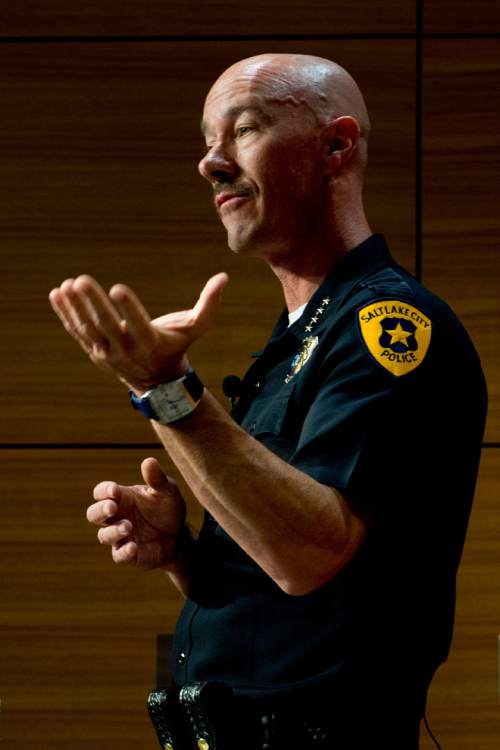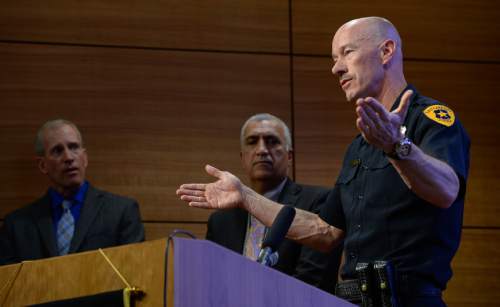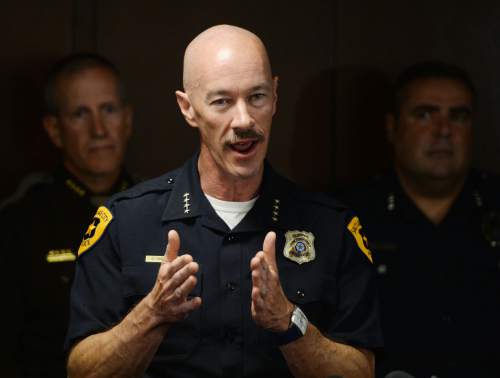This is an archived article that was published on sltrib.com in 2015, and information in the article may be outdated. It is provided only for personal research purposes and may not be reprinted.
If a growing demand for police reforms reflects an erosion of public trust in law enforcement, there is some serious fence-mending to be done in Utah.
The Legislature, in its recent session, debated a dozen bills addressing such high-profile issues as officer use of force, body cameras, search-warrant restrictions and law-enforcement surveillance. About half the proposals passed, enough to leave the police community feeling stung.
"This has been the most difficult session for law enforcement that I've gone through with them," said David Spatafore, a lobbyist who has been representing the Utah Chiefs of Police Association for about 13 years. "The number of bills, the level of scrutiny of police officers, I think, has reached an unparalleled high. Is that bad or is that good, is a great question."
The call for reforms emerged as a top-tier national issue in the wake of the death of Michael Brown in Ferguson, Mo., though that shooting was ruled justified. After a public outcry and widespread protests, the U.S. Justice Department announced a "national initiative for building community trust and justice."
The trend is also visible among states. In Colorado, for example, the Legislature is debating a package of 10 bills aimed at policing reforms, from prevention of racial profiling to establishing a special prosecutor for police-abuse allegations.
In Utah, the issue has been fueled by a rash of police shootings, from Darrien Hunt in Saratoga Springs to Dillon Taylor and James Barker in Salt Lake City. The year began with the startling statistic that the first three homicides of 2015 were officer-involved shootings. These incidents caught the attention of lawmakers in the Republican-controlled Legislature known for its libertarian bent that at times bridges the left and right political divide.
—
Search warrants • Law enforcement was particularly frustrated with the Legislature for passing SB119. It prevents police from accessing the state's Controlled Substance Database, containing details of every Utahns' prescription medications, without first obtaining a search warrant.
Rep. Brad Daw, R-Orem, House sponsor of the bill, cited examples of abuse in recent years including one in 2012, when an officer allegedly used the database to locate prescription narcotics in a Vernal home and confiscate them for his own personal use. In another instance, Daw said Cottonwood Heights police officers tapped the database to look up the records of hundreds of firefighters in a fishing expedition to nab prescription drug offenders.
"I find this to be completely unacceptable," Daw said during floor debate. "I want you to think for a minute what someone can discover about you by looking at your past medical history. … This data is private, it should be kept private, and it should only be searched in the commission of a crime [and with] probable cause."
But Rep. Paul Ray argued the bill was "terrible for the state of Utah." He said police often need to be able to verify information before they can get a search warrant, and the prescription database is one of those tools of verification.
"What we've seen this year is a very anti-law enforcement move up here," Ray, R-Clearfield, said in an interview. "It's been very concerning to me. We ask these guys to go out and do an impossible job, put their lives on the line, and then we get bills up here that take away the tools that they need in order to be successful."
But Connor Boyack, president of the Libertas Institute, said the government should be more concerned about protecting the rights of individuals than about simplifying the job of law enforcement. "We are not interested in providing police officers with better tools they feel would make their job easier. That is a horrible standard, in our view," he said. "To the extent that they follow the law, then, yes, we want to make sure that they can do their job … [but] their job should be difficult."
Spatafore agreed with Ray that SB119 was "overly broad and overly restrictive," but said officers will follow the new policy — approved by a unanimous vote of the Senate and by a better than two-thirds majority in the House.
Other bills approved to tighten restrictions on searches and seizures are SB226, requiring officers to obtain a warrant before using thermal-surveillance devices; SB82, narrowing circumstances for no-knock warrants; and SB52, mandating that law-enforcement agencies submit regular reports detailing property and assets they have seized.
—
Probes, body cams • Law enforcement compromised on a bill that outlined policies regarding investigations of officers' use of force, according to Sen. Deidre Henderson, R-Spanish Fork, Senate sponsor of HB361.
"The police wanted the same thing that the public wants," she said, "and that is some certainty and confidence that investigations will always be done in a fair and impartial way."
The bill sets statewide guidelines for investigations of use of force and incidents when a suspect dies during arrest or while in custody. It requires that such probes be conducted by an outside agency and that investigation policies be public.
"What I have found is that law enforcement is very concerned about making sure that they not only do things the right way, but that they help build the public trust," she said. "I think that we are all just working together to make sure that government, government officials, law enforcement, everybody are accountable to the people that we represent, that we are supposed to protect, to defend."
Following a national trend, multiple police departments in Utah, including those in Salt Lake City and West Valley City, have begun requiring officers to wear body cameras. But legislation outlining specific procedures for officers' use of this new technology, HB386, faltered, failing to make it out of committee.
The bill proposed guidelines for the use and storage of body-cam footage and would have required law enforcement agencies to have their own policies that met or exceeded the minimum standard.
Boyack said his group pushed the bill after it made open-records requests to departments with body cameras and was "alarmed" that many lacked policies.
Law enforcement opposed the proposal because of certain aspects that Spatafore said put the presumption of blame on the officer if a camera failed to record an encounter and that restricted officers from recording in certain situations.
He said body cameras are a step in increasing police transparency that law enforcement endorses, but not a magic solution. "The video from the body camera is not an end all, be all, but there will be a benefit."
—
A deeper look • In light of the increased skepticism and scrutiny surrounding law enforcement, two lawmakers proposed a comprehensive study of outstanding issues — from body cams to use of force to officer training.
"We want the whole story so that, as we proceed down the road, we don't have legislators going all over the place with legislation that may not make sense in the long run," said Rep. Curt Oda, R-Clearfield. "There's a lot of questions. Probably a million questions and very few answers right now. But we want it to be an educational thing for everybody."
SB252, which Oda sponsored in the House, would have assigned the Administrative Rules Review Committee to dig into the topics and provide a report in time for action in next year's legislative session.
"Nationally, America is focused on police use of force and deadly force," said Sen. Howard Stephenson, R-Draper, Senate sponsor of the measure. "There are a lot of questions people have about proper training for public-safety officers and appropriate investigation after shootings occur. We want to not look at any specific case, but instead look at the Utah law to see if it is sufficient."
Stephenson said the purpose of the proposed study was not only to boost the public's confidence in police officers, but also to give police officers more confidence in their ability to handle difficult situations.
"We want to be supportive of our public-safety officers," he said, "and ensure that they have the necessary training to handle these types of situations, and training in de-escalating [confrontations] as well."
The bill passed the Senate unanimously late in the session but never received a vote in the House.
Police body cameras and use of force were placed on the list of study items for the Legislature to take up in the months before the 2016 session, though no action or report is mandated.
Spatafore believes the legislative focus on potential police misconduct is corrosive. He said the "highly critical view of labeling all law-enforcement officers as being not faithful public servants" in certain segments of society and government — along with relatively low pay — has contributed to lowered morale and difficulty in attracting highly qualified recruits.
"Folks aren't staying in the profession, simply because it's not a glamorous profession," he said. "It's going to be tougher and tougher and tougher to get willing men and women to be law-enforcement officials."
Boyack said despite the view by some that debates over police accountability reveal an "anti-law enforcement" attitude, he praised lawmakers for doing their job.
"Legislators are tasked with setting public policy and protecting the rights of their constituents. Police officers are employed by the citizens to protect them. And if the laws need to be changed to better find that balance, it is not maligning the actions of any specific officer or law enforcement more broadly. It is a serious policy issue that deserves to be discussed and debated by elected officials who have been charged with doing exactly that."
Dan Harrie contributed to this report. —
Policing reforms
Bills that passed:
HB296 (second substitute) • Carves out a narrow exception for law-enforcement agencies to use drones in search-and-rescue operations without first obtaining a search warrant.
HB361 • Sets a statewide standard for investigations of police officers' use of force and requires that the probes be conducted by an outside agency.
SB52 (first substitute) • Requires law enforcement agencies to submit reports about property they have seized.
SB82 (first substitute) • Requires officers to clearly identify themselves when serving forcible entry (no-knock) warrants and prevents them from serving such warrants in instances of only drug possession.
SB119 (first substitute) • Prevents police officers from accessing the state's Controlled Substance Database without first obtaining a warrant.
SB226 • Requires police to obtain a search warrant to use thermal-imaging surveillance devices and to notify the target that the device was used after the warrant is served.
Not passed:
HB167 • Would have reformed asset forfeiture regulations to strengthen property rights protections.
HB308 (first substitute) • To allow a police officer to return to owner items obtained in a search warrant if they were deemed irrelevant to the investigation.
HB386 • Would set minimum guidelines for officers' use of body cameras and require agencies using them to adopt written policies.
HB442 (first substitute) • Would have amended definitions regarding deployment of armored vehicles and reportable incidents and required public reports.
SB252 (first substitute) • Would have authorized comprehensive study of officers' use of force investigations and training, state laws regarding fines and forfeitures and ways to improve public perception of law enforcement agencies.
SB290 • Would have repealed a provision giving police officers absolute immunity from liability when chasing fleeing suspects.









